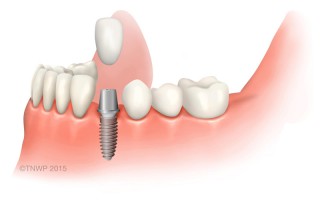Can I have a dental implant to replace one missing tooth?
Dental implants are the next best thing to healthy, natural teeth. Implants are permanent alternatives for failing or missing tooth roots and the only treatment available that replaces both the lost natural tooth and its root.
 If you have one tooth missing, you can have an implant to support a new single crown. The crown is made to the shade and shape of your natural teeth. The replacement tooth is attached to a titanium implant, your new artificial root, with a connecting abutment. The implant fuses with the jaw, a process called osseointegration, which results in a secure bond between the implant and surrounding bone.
If you have one tooth missing, you can have an implant to support a new single crown. The crown is made to the shade and shape of your natural teeth. The replacement tooth is attached to a titanium implant, your new artificial root, with a connecting abutment. The implant fuses with the jaw, a process called osseointegration, which results in a secure bond between the implant and surrounding bone.
It is easy to think that losing a tooth is not going to cause you any problems, and you may consider leaving a gap. But missing teeth can affect your confidence and the overall health of your mouth. We tend to think about teeth as individual units, but teeth work together in harmony, and problems can occur when they don’t. Replacing your missing tooth with a dental implant can help:
Maintain a confident smile
If your gap is visible when you smile, then you may feel self-conscious and embarrassed. People with missing or failing teeth are often reluctant to smile properly and this can affect how you interact with others socially and at work. Dental implants can help you regain a healthy-looking smile.
Prevent bone disappearing
When you are left with a gap, the bone beneath it can begin to shrink, a process known as resorption. This is because the area is not being stimulated by chewing. A dental implant can prevent this happening because it is integrated directly into the jawbone, replacing the missing tooth root.
Stop teeth moving
A gap from a missing tooth can encourage adjacent teeth to move or drift into the space. Teeth out of their normal position can negatively affect your bite – a condition called malocclusion. This can change the way we chew and have an impact on the surrounding muscles and joints, resulting in symptoms such as headaches. It can also make teeth harder to clean and may increase risk from decay and gum disease. A gap can also cause an opposing tooth to protrude into the missing space – a process known as overeruption. This may result in root structure becoming exposed, risking decay and inflammation. A dental implant can prevent your healthy teeth from shifting into an empty space and helps to provide a solid structure, maintaining your bite and reducing the load on remaining teeth.
Avoid damage to healthy teeth
If you choose a bridge to replace a tooth, your dentist would need to prepare the teeth either side of the gap. They need to be crowned, in order to support the bridge. This involves healthy tooth structure being shaved away. Dental implants are normally placed in the spot where you lost your original tooth, without impacting on adjacent healthy teeth.
Teeth implants are usually considered the treatment of choice for a missing tooth. You can receive dental implant treatment from any of the implant dentists listed on www.click4teeth.com. Find the one closest to you and contact them directly through the website.
